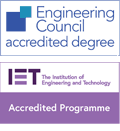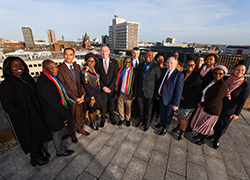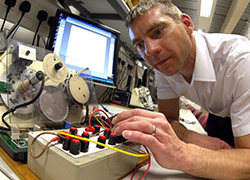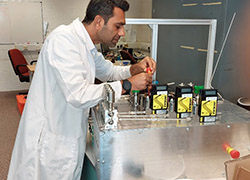Course overview
Sustainable engineering/energy and clean technology
Study a masters course in sustainable engineering/energy and clean technology and you may be eligible for a £12k scholarship
You cover a number of topics in sustainable energy and clean technology, broadening and deepening your understanding and knowledge of the field. You learn how to synthesise information from a variety of sources and develop your decision-making abilities in solving complex sustainability problems. Working with a supervisor, you also conduct a research project in a specific area of sustainable engineering.
You cover a number of topics in sustainability, broadening and deepening your understanding and knowledge of the field. You learn how to synthesise information from a variety of sources and develop your decision-making abilities in solving complex sustainability problems. Working with a supervisor, you also conduct a research project in a specific area of sustainable engineering.
Here at Teesside University, we undertake varied research in sustainability and are involved in several regional strategic projects, and we are spearheading an ongoing drive for clean energy and sustainability though our Net Zero Innovation Hub. Part of this includes a Net Zero Industry Innovation Centre, an innovative new £13.1m facility and key component of Tees Valley Combined Authority's regional innovation strategy, which will position Teesside firmly at the heart of the UK's green industrial revolution.
We are based in the Tees Valley, a hub of the green energy industry, housing bioethanol, hydrogen and offshore wind farms. The region is also a centre for investment in carbon capture and storage, and industrial decarbonisation. Delivering a Net Zero Teesside.
If you a looking to be involved in net zero initiatives, then this course is an ideal launchpad for your career, and there are a number of £12,000 Kellas Midstream Clean Energy Scholarships available to fund your studies. Find out more.
Course details
Course structure
Core modules
You investigate an area of engineering and work independently to a level recognised to be at the forefront of the discipline. The topic can be in the form of a research project or a design project. Key skills in research and in knowledge application and creation will be developed through keynote lectures and self-managed independent study. You are required to demonstrate the capacity for a comprehensive and objective analysis, and for developing innovative and constructive proposals for the solution to the project topic.
Hydrogen Technologies and Fuel Cells
You explore the methods and technologies used to transport and accumulate hydrogen, and analyse the introduction of the hydrogen vector in the energy sector, paying attention to end use devices, for example fuel cells. You develop your knowledge of recent technologies relating to hydrogen, analyse real-world case studies, and explore the calculation codes for the measurement and testing of the performance of fuel cells.
The module provides students with in-depth knowledge of the theory and principles of renewable energy technologies used for electricity generation. The module focuses on the principles, design, operation and grid connected applications of wind and photovoltaic technologies, and contrasts these with conventional power systems, such as coal and gas. The module will inform the student of current practices and technological advances in the field of renewables and will provide an opportunity to develop computing and practical skills related to this area.
The module provides students with an in-depth knowledge of the principles of operation, design and utilisation of smart grids to optimise the transmission and distribution of power. It provides a generic treatment of various power system topologies with an emphasis on critical design parameters at distribution level and the evolution to the wider transmission network. The impact on existing networks and future developmental opportunities are considered alongside automation and control requirements. The module will also inform the students of recent technological advances in the field of electrical power transmission and will provide an opportunity to develop practical skills related to this area.
You will investigate how the role of the engineer is becoming more focused on serving society as well as industry and to recognise the impact of engineers’ decisions on society and the environment.
As engineers of the future, you will need to have a sustainable worldview, acknowledging international, cultural, and diversity issues in society. In addition, you will also be expected to solve complex problems with consideration for multi-perspective views, long-term effects, risk, and the impacts of decisions on society.
This module will examine the key topics surrounding sustainability in the context of engineering applications across a range of disciplines and key future challenges such as energy, transport, and construction.
The subjects will be taught through a combination of lectures and seminars. Lectures will develop key concepts and knowledge. Seminars will allow more focused examinations of important issues and approaches.
Zero Carbon Built Infrastructure
Built infrastructure consumes large amounts of energy, carbon and water, and produces pollution and waste during construction and operation. Sustainable design through green approaches can reduce environmental impacts substantially, decrease carbon dioxide emissions and reduce embodied carbon. You examine the design, construction and operation of zero carbon built infrastructure. Lectures develop key concepts and knowledge, seminars allow more focused examinations of important issues and approaches, and IT lab sessions develop your skills in using life cycle analysis software.
and one optional module
Big Data and Business Intelligence
You develop your ability to design and implement database, big data and analytics applications to meet business needs. A case study is used to follow the system development lifecycle. You develop a plausible application from inception to implementation for a real-world scenario.
You investigate the issues and technologies associated with implementing and supporting large scale databases and the services that are needed to maintain and access a repository of data. Investigations are undertaken in a number of areas including big data, data warehouses, integrating legacy data, data management and approaches that support the modelling and visualisation of data for a range of use views.
Circular economy is an economic model that invites businesses, cities and countries to transform their approach to the use of materials and energy, and build a framework for an economy that is restorative and regenerative by design. It is an interdisciplinary arena embracing physical, social sciences and manufacture. You explore key topics relating to the practical applications of circular economy and examine approaches to solving challenges for achieving circular economy and environmental sustainability.
Power Conversion for Energy Systems
The module provides students with an in-depth knowledge of Power Electronic converters as they are used on power systems to allow efficient transmission of power from generator to consumer. The modules will teach about the operation and design of the main converters and their applications. It provides a generic treatment of various converter topologies with an emphasis on critical design parameters. Applications including HV DC transmission, static VAr compensation and interconnection of renewable energy sources and energy storage systems to utility grid are considered.
Project Management Philosophies and Tools
Contemporary project management is an evolving and extensive discipline that has grown substantially to meet the needs of modern project management demands. This module cultivates detailed and critical awareness of this domain and its expanding range of philosophies, tools and frameworks.
The purpose of this module is to introduce students to the expanding discipline of project management and familiarise them with modern and contemporary project management modalities and the importance of effective project management to organisational functioning, enterprise growth and development.
Modules offered may vary.
How you learn
You learn through lectures, tutorials and computer lab sessions.
Lectures deliver substantial elements of the subject content, provide explanations of complex concepts, and set the scene for your independent learning.
Tutorials and seminars are interactive and allow you to explore relevant topics in depth.
Some of the modules require specialist technical software and practical computer-based sessions are timetabled. You are supported in technical modules by industry-standard lab and computing facilities.
How you are assessed
You are assessed on your subject knowledge, independent thought and skills acquisition.
Assessments include design and lab reports, portfolios, exams, group work, posters presentations, technical interviews/oral presentations, literature surveys, evaluations and summaries, and a dissertation.
Entry requirements
Normally a 2.2 UK honours degree (or equivalent) in a subject with significant engineering content. This could include any engineering subject, technology, physics, and mathematics degrees which include applied maths subjects (for example, dynamics or fluid mechanics).
Students with a degree awarded outside the UK must also meet the University's minimum English language requirements.
International applicants who need a student visa to study in the UK should check our web pages on UKVI-compliant English language requirements. The University also provides pre-sessional English language courses if you do not meet the minimum English language requirement.
For general information please see our overview of entry requirements
International applicants can find out what qualifications they need by visiting Your Country
Employability
Career opportunities
This course gives you an industrially, commercially and professionally relevant education by developing your lifelong learning skills and giving you a progression route for further professional development.
You are prepared for a career understanding and tackling sustainability issues, driving rapid change in all sectors and contributing to climate change agendas at a regional, national and international level. You can work in a technical or managerial role in industrial sectors including manufacturing, chemicals and processing.
Information for international applicants
Qualifications
International applicants - find out what qualifications you need by selecting your country below.
Select your country:
Useful information
Visit our international pages for useful information for non-UK students and applicants.


 University collaboration with South Africa to support hydrogen research
University collaboration with South Africa to support hydrogen research Net Zero accolade for Teesside University academic
Net Zero accolade for Teesside University academic Project ‘Joseph’ to deliver ground-breaking hydrogen purification technology
Project ‘Joseph’ to deliver ground-breaking hydrogen purification technology